IOS lecture on “Muslim Minority and Legitimacy of Government of India’s Federal Democracy”
October 10, 2015 at 162, Jogabai, Institute Building, Jamia Nagar, New Delhi
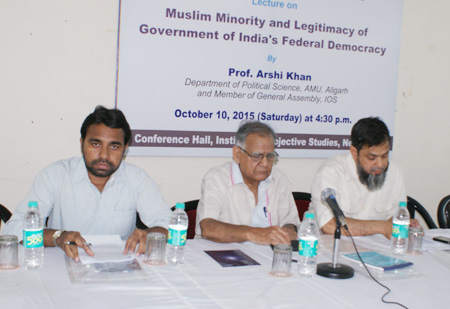
L-R: Dr Aftab Alam, Assistant Professor of Political Science, Zakir Husain College, Delhi University; Prof. ZM Khan, Secretary General of the IOS and Prof. Arshi Khan of the Department of Political Science, Aligarh Muslim University and Member of the General Assembly, IOS
New Delhi, Oct. 10: As part of a series of lectures, the Institute of Objective Studies organised a lecture on the “Muslim Minority and Legitimacy of Government of India’s Federal Democracy” at the conference hall of the Institute here today. Delivering the lecture, Prof. Arshi Khan of the Department of Political Science, Aligarh Muslim University and Member of the General Assembly, IOS, commented that democracy was not only the name of the elected and contested institutions, but it was directly connected with the legitimacy and the performance of the government. In plural societies like India, the role of democracy differed from being the agency of administration and control, because the governing institutions were expected to provide security, rights and participation to the excluded minority community as major part of constitutional obligations. He noted that the purpose of democracy in India was also concerned with the performance of the government vis-à-vis the Muslim minority and other excluded groups.
Dr. Khan observed that democracy secured participation of diversities in the polity and the enforcement agencies and federalism recognised the principles of constitutional devolution of powers and autonomy to the regions and communities. It was the federal democracy which harmonised the interests of the French and Italians with the German majority groups in Switzerland, he said. He maintained that India was known as the largest democracy in the world with the attributes of federalism and its Constitution and the provision of Fundamental Rights. These political structures and principles of democratic governance were endorsed by the Constituent Assembly of India in 1949 for accelerating the nation-building process. It was expected by leading members of the Assembly that political parties would produce concurrent majorities for the adequate participation of Muslims who were, before 1947, entitled to reserved seats and weightage vote in the regions where Muslims were not in large numbers. He lamented that despite sixteen general elections and several assembly elections, India’s democratic institutions could not accommodate values and concerns of the Muslim community of the country as political values of governing structures.
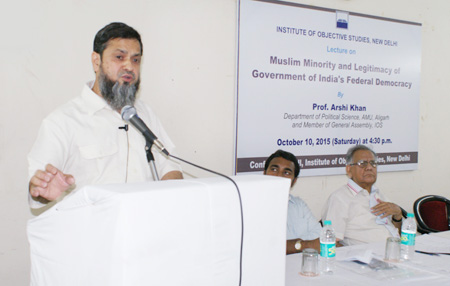
Dr. Khan pointed out that protection, rights and the participation of the Muslim community in India constituted the master key for securing the legitimacy of the government in the eyes of the largest minority community. Sangh Parivar becoming the guardians of the country, that too without the vote of the Muslim community, he said, raised the issue of the legitimacy of the government. The BJP formed the government at the Centre in 2014 and the majority of the Muslims voted for other parties which were not against Muslims in their thoughts and actions. The existing method of election had failed to provide percentage of seats according to the percentage of the votes polled, he said. This had largely affected the political culture of the country making Muslims vulnerable to other parties. He opined that the statements, nominations, appointments, policies and actions with extreme prejudice against Muslims certainly raised the question of the legitimacy of the government in the eyes of the Muslim minority community.
Emphasising that in a heterogeneous society, the task before democracy became more challenging with greater responsibility. Dr Arshi said that political exclusiveness of a social group would be a retrograde step. In a country like India, diversity of religion, caste, tradition, region, etc, should not be intensified with a particular party. The state being a resource centre, efforts must be made to contrive a mechanism for taking care of the excluded communities. Government was a national body without being identified with Hindus or Muslims. In a democracy, legitimacy was linked to the universality of action. There was the question of legitimacy of an institution created for the protection of rights of all the communities. Questioning the legitimacy of the institution called state, he wanted to know if the diversity guaranteed sharing of power. He concluded by saying that the system had failed and government was not working.
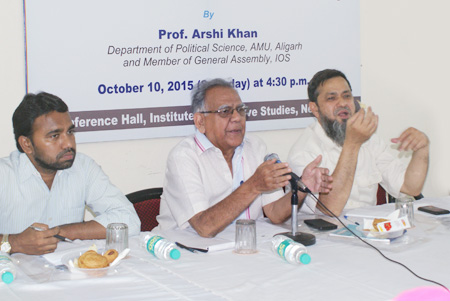
Presiding over the function, the Secretary General of the IOS, Prof. ZM Khan said that legitimacy was a larger issue which required weeks to deliberate on. He called for another programme on the subject.
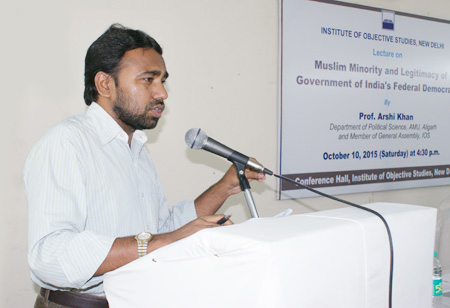
Earlier, Hafiz Athar Husain recited a verse from the Quran. Assistant Professor of Political Science, Zakir Husain College, Delhi University, Dr Aftab Alam introduced the subject and also conducted the proceedings. The lecture was followed by a question-answer session.
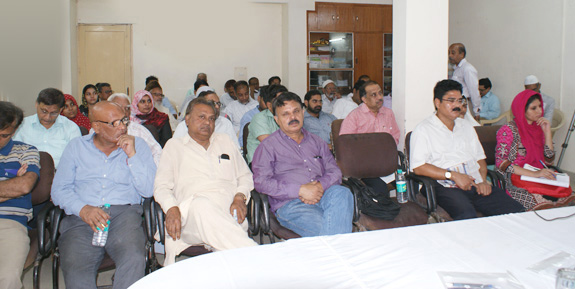
A view of audience
The lecture was attended by a good number of academics, social activists, researchers and prominent citizens, including Dr Eqbal Husain, Mohd. Sohrab, Dr. Tarique Ashraf, Shabnam Akhtar, Haja Shahabuddin, Sameena Musheerah, Shamshad Ikram, Dr. Mohammad Qasim, Dr Mohammad Ehsan, Mohammad Umar, Chaudhary Naseer Ahmed, Abdul Haq Falahi and Khalid Nadeem Khan etc.
|